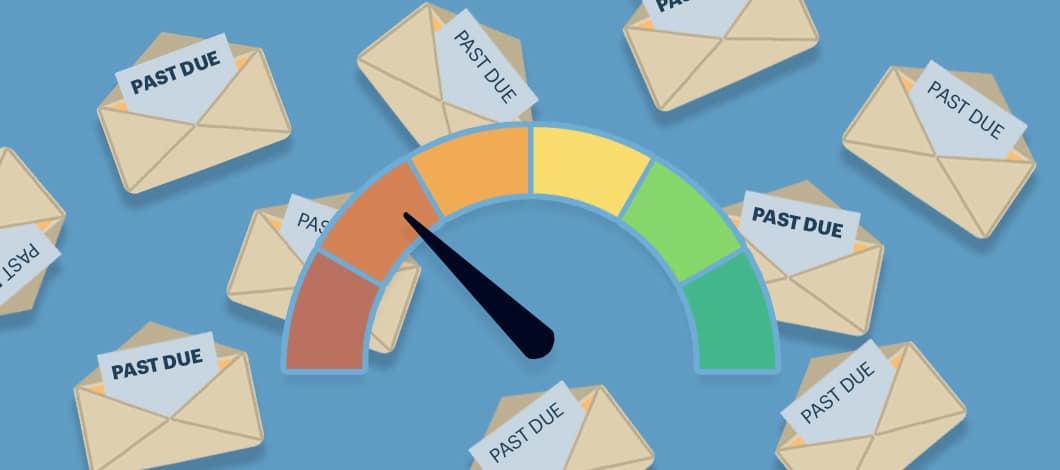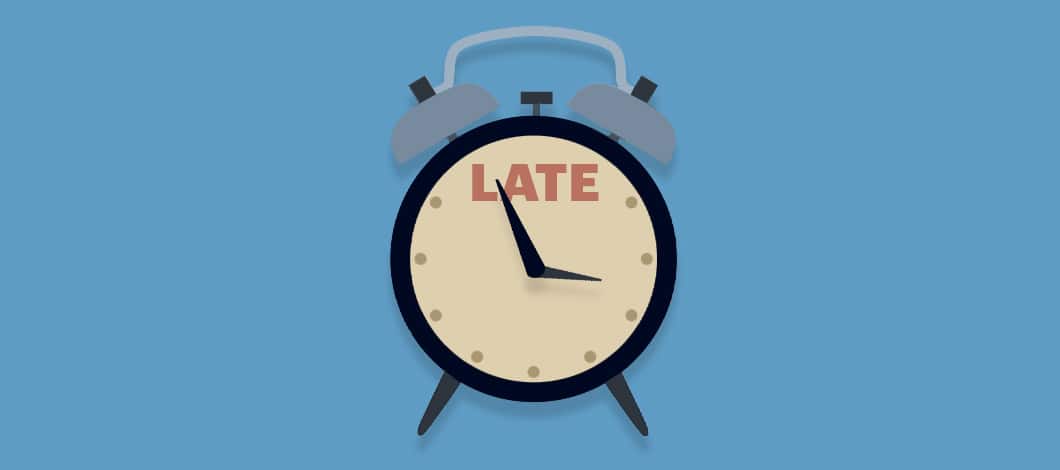When you make late payments, credit score numbers suffer. Fortunately, you can take steps to prevent and mitigate the impact. In this blog, we’ll first look at how late payments affect your credit score, when payments are considered late, when they show up on your credit report and when they fall off. Then we’ll explore ways to remove late payments from your report, how to avoid them in the first place and what you can do if you already have a history of late payments.
How Do Late Payments Affect Your Credit Score?
When credit-reporting firms and lenders evaluate your creditworthiness, a missed payment on credit report data can lower your score significantly. For both personal credit scores and business credit scores, payment history weighs in as one of the biggest factors determining your score.
According to credit-reporting provider Experian, your history of paying bills on time counts toward 35% of your total FICO score, one of the most popular personal credit scoring systems. Consistently making payments on time will raise this part of your score, while items such as collections actions and bankruptcy will hurt your score.
Similarly, business credit score provider Dun & Bradstreet explains that slow and late payments can hurt a company’s credit rating. For example, the PAYDEX scoring system measures how quickly a company pays its bills. The more often a company makes late payments and the later the payments are, the lower its PAYDEX score. Paying on time or in advance can raise the score.

When Is a Payment Considered Late?
Under the Fair Credit Reporting Act (FCRA), creditors must wait until a payment is at least 30 days late before reporting it to a credit-reporting firm. However, the FCRA doesn’t require creditors to report late payments. Some creditors may choose to wait longer if they feel they have a reasonable chance of getting paid.
Because of this, what constitutes a late payment may vary from one creditor to another, which may give you a window to pay your bill before it triggers a delinquent account on credit report data. But generally, any time you let a payment get 30 days past due, you risk the payment being reported as late. And for business payments, the longer you wait, the more serious delinquency credit score impact you risk.
Be aware that even before a payment gets reported as late, your creditor may charge you late fees. You owe your creditor any late fees even if they don’t report your payment as late.
When Does a Delinquent Payment Show Up on Your Credit Report?
Late payments don’t show up on your credit report until after your creditor reports them. When filing reports, creditors use different codes to indicate whether your payments are on time or late. Payments up to 29 days late don’t have a code and count as current. Payments 30 or more days late get marked as late. However, creditors may not report late payments immediately. There may be additional time before an item shows up on your credit report.
For example, many creditors file credit reports monthly. In that case, it may take as long as 61 days for an item 30 days late to show up. Some creditors may file reports less frequently. That can make it take even longer for an item to appear. In some cases, you may have already made the late payment before your creditor reports it being late. That can create lags and inconsistencies between your actual payment history with your creditor and the data on your credit report.
This is one reason it’s important periodically to review your credit report and look for outdated and inaccurate items.
When Do Late Payments Fall Off Credit Report Scores?
After a payment gets reported as late to a credit-reporting firm, it can remain on your record for up to 7 years.
Say you make your account current with your creditor after being late on a payment. The fact that your payment was late stays on your report for 7 years. After that, late payments and other negative information get removed from your report.
Let’s say you’ve filed for Chapter 7 bankruptcy protection. Although the bankruptcy stays on your credit report for 10 years, your late payments still get removed after 7 years.
Can You Remove Late Payments on Credit Report Scores?
There are several steps you can take to remove late payments from your credit report:
- Paying your bill over 30 days late may not remove your late payment entirely from your record, but at least it will update your record to reflect that you brought your account current, reducing missed payment credit score impact
- You may be able to negotiate with your creditor (for example, by paying a late fee) to amend their report to the credit-reporting firm and remove their late payment claim
- If your creditor made a mistake by reporting a payment that actually wasn’t late, you either can bring the item to the attention of your creditor and ask them to correct the record, or you can contact the credit-reporting firm and ask them to have your creditor conduct an investigation
- You can wait for items 7 years old to be removed automatically
To apply these strategies, it’s important to monitor your credit report. That way you know which items are still being reported as late and which have been removed. The website of the Federal Trade Commission provides information on how to exercise your right to obtain a free credit report once a year from the major credit-reporting firms and 6 free reports a year from the website of credit-reporting provider Equifax. In addition to these free resources, you can pay for commercial credit reports and credit-monitoring services.
Note that even after a late payment dispute has been resolved, the update may not appear on your credit report until after your creditor files a new report with the credit-reporting firm.

How Can You Avoid Late Payments from Going on Your Credit Score?
It’s easier to prevent late payments from being reported than to remove them once they’ve been reported. You can use several methods to prevent late payments from being reported:
- Automate your bill payments so that your bills get paid on time
- Review your monthly due dates for your bills and consider whether requesting a different due date would enable you to keep up with payments
- Contact your creditor as soon as you notice a bill is late to advise them of your intent to pay as soon as possible
- Negotiate with your creditor to allow a payment deadline extension or a late payment fee instead of reporting your late payment
To apply these methods of preventing late payments, you may need to review your business financing strategy to make sure you have sufficient cash flow to keep up with your payment obligations. For example, a line of credit may provide you with cash resources for covering bills to keep them from becoming delinquent.
What Steps Can You Take to Accelerate Credit Score Recovery After Late Payment Incidents?
If you already have late payments listed with credit-reporting firms, you should take a number of corrective steps:
- Obtain your credit reports to see what’s been reported as late
- Dispute any inaccurate or outdated items
- Reach out to creditors to negotiate resolutions to outstanding items
- Establish a track record of paying bills on time going forward
- Start reviewing your credit report periodically to catch any new late items which get reported correctly or incorrectly
Use these strategies to get back on track if you’ve been impacted by late payments.
Don’t Let Late Payments Hurt Your Financing Needs
Payment history is one of the biggest factors impacting your personal and business credit scores. That means making late payments is one of the most damaging items which can appear on your credit report.
Payments must be 30 days late or more before they get reported. However, creditors follow different reporting schedules. So it may take longer than this for late items to show up on your report. If you don’t take steps to remove them, late payments can stay on your record for 7 years.
You can get late payments removed from your report by negotiating with your creditor or disputing items. However, it’s easier to avoid late payments by taking steps such as:
- Automating bill payments
- Adjusting due dates
- Resolving payments with your creditors before they get reported as late
If you need a new financing strategy or additional resources to keep up with your payments, take a few minutes to fill out our free, no-obligation prequalifying form and see what loan options you may qualify for with your current credit score.










